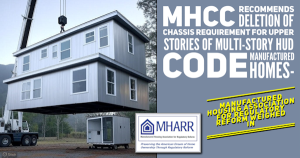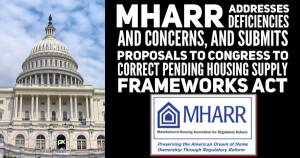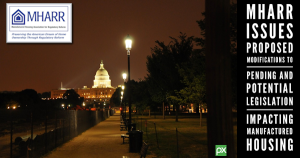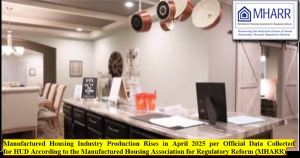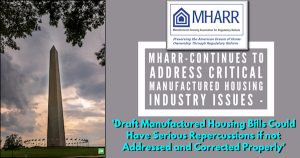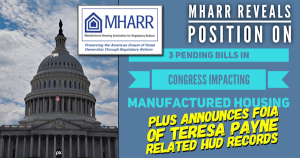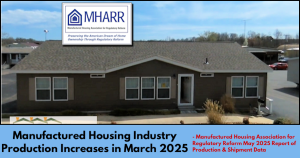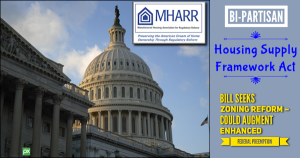MHARR Presses FHFA for Action to End Fannie’s and Freddie’s Duty to Serve Manufactured Housing Farce
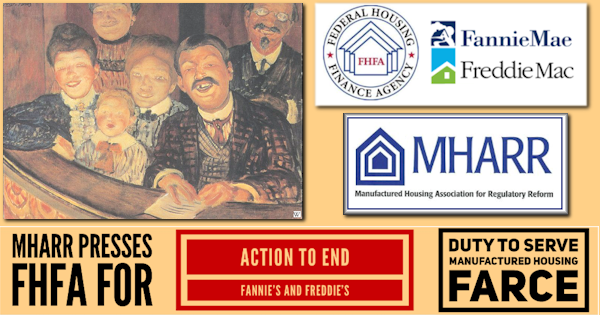
Washington, D.C., May 14, 2020 – The Manufactured Housing Association for Regulatory Reform (MHARR) in a May 11, 2020 communication to Federal Housing Finance Agency (FHFA) Director, Mark Calabria copy attached, has called for an end to a decade-plus of stonewalling, stalling and misdirection by Fannie Mae and Freddie Mac regarding the implementation of the “Duty to Serve Underserved Markets” (DTS) as it pertains to federally-regulated manufactured housing.
The statutory DTS mandate, enacted into law as part of the Housing and Economic Recovery Act of 2008 (HERA), is specifically designed to remedy the long-term and ongoing failure of the two government-sponsored and taxpayer-supported mortgage giants – Fannie Mae and Freddie Mac – to provide securitization and secondary market support for certain historically underserved markets, and millions of consumers within those markets. DTS, therefore, among other things, affirmatively directs both Fannie Mae and Freddie Mac to “develop loan products and flexible underwriting guidelines to facilitate a secondary market for mortgages on manufactured homes for very low, low and moderate-income families,” including manufactured housing purchase loans “secured by both real and personal property.” (Emphasis added).
Congress’ inclusion of both real and personal property loans for manufactured homes within the express scope of DTS is particularly significant because personal property (or “chattel”) loans comprise (and have long constituted) the vast bulk of the purchase-lending market for federally-regulated manufactured homes, representing nearly eighty percent (80%) of all manufactured home purchase loans over the past decade, according to official U.S. Census Bureau data.
In the twelve years that have passed since Congress’ enactment of DTS, however, neither Fannie Mae nor Freddie Mac have securitized or provided secondary market support for such manufactured housing personal property loans. Nor have Fannie Mae or Freddie Mac developed any type of program, approach or sustained institutional mechanism for the securitization and/or secondary market support of such loans – in market-significant numbers or otherwise – that has been approved or otherwise sanctioned by FHFA, which serves as the mortgage giants’ federal regulator. As a result, the vast bulk and vast majority of manufactured housing consumers (i.e., lower and moderate-income American families in need of inherently affordable homeownership in the midst of an affordable housing crisis) have been left completely unserved by Fannie Mae and Freddie Mac with the blessing and concurrence of FHFA, directly contrary to the express will and mandate of Congress.
This ongoing policy failure – and overt discrimination — on the part of FHFA, Fannie Mae and Freddie Mac has had three distinct but inherently-related and highly-destructive impacts on American consumers of affordable housing and the market for mainstream, inherently affordable manufactured housing.
First, it has prevented untold numbers of lower and moderate-income Americans from being able to access and purchase the nation’s most affordable type of housing and homeownership, thereby needlessly exacerbating the nation’s housing crisis and the well-documented societal ills associated with a lack of affordable housing opportunities. Such market exclusion by the mortgage giants, with the connivance of FHFA and its predecessors over the course of decades– which DTS was designed and structured to remedy – is, in and of itself, an inexcusable, indefensible and glaring failure that demands an immediate remedy.
Second, it specifically targets lower and moderate–income consumers for baseless, government-sanctioned financing discrimination, which forces manufactured housing consumers to seek purchase financing from a limited number of “portfolio” lenders which charge higher interest rates than lenders in markets that have the benefit of Fannie Mae and Freddie Mac securitization and secondary market support. This needlessly excludes otherwise-qualified borrowers from the manufactured housing market, while it forces those purchasers who do qualify for financing to pay higher-cost interest rates than would otherwise be the case.
Third, it has needlessly suppressed and seriously harmed the market for today’s modern, quality, affordable, mainstream manufactured housing (and employment and job opportunities within that national market) as manufactured home sales have significantly underperformed historic industry norms over the entire decade-plus period since the enactment of DTS, which Fannie, Freddie and FHFA have needlessly squandered and wasted with phony excuses, false starts and empty promises.
Worse yet, while the full, market-significant implementation of DTS for the mainstream federally-regulated manufactured housing market has been needlessly and baselessly hamstrung for more than a decade, Fannie Mae and Freddie Mac, with the knowledge and de facto support of FHFA have sought – over the same period — to divert DTS from the mainstream manufactured housing market and mainstream manufactured housing consumers, as directed by Congress, to a much-more-costly, non-affordable, non-mainstream, “new class,” “new type,” “or new generation” of supposed manufactured home that more closely resembles and imitates the type of site-built housing that Fannie and Freddie would clearly prefer to deal with. This pernicious tactic – with the unfortunate complicity of some within the manufactured housing industry – is a blatant diversion of DTS from its fundamental purpose and yet another slap in the face for millions of lower and moderate-income consumers of affordable housing who have needlessly and inexcusably been kept waiting for mainstream HUD Code housing support under DTS.
MHARR’s communication, accordingly, calls on the FHFA Director to take immediate steps to fully implement DTS for the mainstream manufactured housing market in market-significant numbers. Anything short of that should trigger an internal investigation of this entire matter by FHFA’s Inspector General. Alternatively, FHFA should seek congressional oversight and appropriate adjustments to DTS (if necessary) in order to make it fully-functional and fully operative for the mainstream manufactured housing market and mainstream manufactured housing consumers.
In Washington, D.C., MHARR President and CEO, Mark Weiss, stated: “After twelve years of baseless delays, diversions, dodges and excuses, it is time for Fannie Mae and Freddie Mac to fully implement their responsibilities and statutory duty under DTS, and it is time for their federal regulator, FHFA, to demand their full compliance with the law for the benefit of lower and moderate-income American consumers of affordable housing. FHFA Director Mark Calabria has a responsibility, both to Congress and to the American people, to fully and finally implement this key mandate for affordable housing and homeownership right now.”
The Manufactured Housing Association for Regulatory Reform is a Washington, D.C.-based national trade association representing the views and interests of independent producers of federally-regulated manufactured housing.
Attached copy


Washington, D.C., May 14, 2020 – The Manufactured Housing Association for Regulatory Reform (MHARR) in a May 11, 2020 communication to Federal Housing Finance Agency (FHFA) Director, Mark Calabria copy attached, has called for an end to a decade-plus of stonewalling, stalling and misdirection by Fannie Mae and Freddie Mac regarding the implementation of the “Duty to Serve Underserved Markets” (DTS) as it pertains to federally-regulated manufactured housing.
The statutory DTS mandate, enacted into law as part of the Housing and Economic Recovery Act of 2008 (HERA), is specifically designed to remedy the long-term and ongoing failure of the two government-sponsored and taxpayer-supported mortgage giants – Fannie Mae and Freddie Mac – to provide securitization and secondary market support for certain historically underserved markets, and millions of consumers within those markets. DTS, therefore, among other things, affirmatively directs both Fannie Mae and Freddie Mac to “develop loan products and flexible underwriting guidelines to facilitate a secondary market for mortgages on manufactured homes for very low, low and moderate-income families,” including manufactured housing purchase loans “secured by both real and personal property.” (Emphasis added).
Congress’ inclusion of both real and personal property loans for manufactured homes within the express scope of DTS is particularly significant because personal property (or “chattel”) loans comprise (and have long constituted) the vast bulk of the purchase-lending market for federally-regulated manufactured homes, representing nearly eighty percent (80%) of all manufactured home purchase loans over the past decade, according to official U.S. Census Bureau data.
In the twelve years that have passed since Congress’ enactment of DTS, however, neither Fannie Mae nor Freddie Mac have securitized or provided secondary market support for such manufactured housing personal property loans. Nor have Fannie Mae or Freddie Mac developed any type of program, approach or sustained institutional mechanism for the securitization and/or secondary market support of such loans – in market-significant numbers or otherwise – that has been approved or otherwise sanctioned by FHFA, which serves as the mortgage giants’ federal regulator. As a result, the vast bulk and vast majority of manufactured housing consumers (i.e., lower and moderate-income American families in need of inherently affordable homeownership in the midst of an affordable housing crisis) have been left completely unserved by Fannie Mae and Freddie Mac with the blessing and concurrence of FHFA, directly contrary to the express will and mandate of Congress.
This ongoing policy failure – and overt discrimination — on the part of FHFA, Fannie Mae and Freddie Mac has had three distinct but inherently-related and highly-destructive impacts on American consumers of affordable housing and the market for mainstream, inherently affordable manufactured housing.
First, it has prevented untold numbers of lower and moderate-income Americans from being able to access and purchase the nation’s most affordable type of housing and homeownership, thereby needlessly exacerbating the nation’s housing crisis and the well-documented societal ills associated with a lack of affordable housing opportunities. Such market exclusion by the mortgage giants, with the connivance of FHFA and its predecessors over the course of decades– which DTS was designed and structured to remedy – is, in and of itself, an inexcusable, indefensible and glaring failure that demands an immediate remedy.
Second, it specifically targets lower and moderate–income consumers for baseless, government-sanctioned financing discrimination, which forces manufactured housing consumers to seek purchase financing from a limited number of “portfolio” lenders which charge higher interest rates than lenders in markets that have the benefit of Fannie Mae and Freddie Mac securitization and secondary market support. This needlessly excludes otherwise-qualified borrowers from the manufactured housing market, while it forces those purchasers who do qualify for financing to pay higher-cost interest rates than would otherwise be the case.
Third, it has needlessly suppressed and seriously harmed the market for today’s modern, quality, affordable, mainstream manufactured housing (and employment and job opportunities within that national market) as manufactured home sales have significantly underperformed historic industry norms over the entire decade-plus period since the enactment of DTS, which Fannie, Freddie and FHFA have needlessly squandered and wasted with phony excuses, false starts and empty promises.
Worse yet, while the full, market-significant implementation of DTS for the mainstream federally-regulated manufactured housing market has been needlessly and baselessly hamstrung for more than a decade, Fannie Mae and Freddie Mac, with the knowledge and de facto support of FHFA have sought – over the same period — to divert DTS from the mainstream manufactured housing market and mainstream manufactured housing consumers, as directed by Congress, to a much-more-costly, non-affordable, non-mainstream, “new class,” “new type,” “or new generation” of supposed manufactured home that more closely resembles and imitates the type of site-built housing that Fannie and Freddie would clearly prefer to deal with. This pernicious tactic – with the unfortunate complicity of some within the manufactured housing industry – is a blatant diversion of DTS from its fundamental purpose and yet another slap in the face for millions of lower and moderate-income consumers of affordable housing who have needlessly and inexcusably been kept waiting for mainstream HUD Code housing support under DTS.
MHARR’s communication, accordingly, calls on the FHFA Director to take immediate steps to fully implement DTS for the mainstream manufactured housing market in market-significant numbers. Anything short of that should trigger an internal investigation of this entire matter by FHFA’s Inspector General. Alternatively, FHFA should seek congressional oversight and appropriate adjustments to DTS (if necessary) in order to make it fully-functional and fully operative for the mainstream manufactured housing market and mainstream manufactured housing consumers.
In Washington, D.C., MHARR President and CEO, Mark Weiss, stated: “After twelve years of baseless delays, diversions, dodges and excuses, it is time for Fannie Mae and Freddie Mac to fully implement their responsibilities and statutory duty under DTS, and it is time for their federal regulator, FHFA, to demand their full compliance with the law for the benefit of lower and moderate-income American consumers of affordable housing. FHFA Director Mark Calabria has a responsibility, both to Congress and to the American people, to fully and finally implement this key mandate for affordable housing and homeownership right now.”
The Manufactured Housing Association for Regulatory Reform is a Washington, D.C.-based national trade association representing the views and interests of independent producers of federally-regulated manufactured housing.
Attached copy





